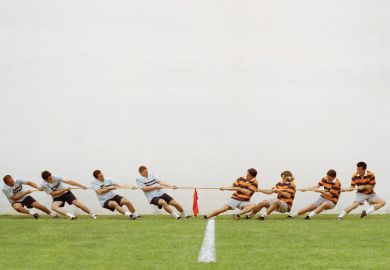Undergraduates frequently complain that they don’t have enough contact hours. But a major study in the UK suggests that students develop skills better out of – rather than in – the classroom.
The 2016 UK Engagement Survey, conducted by the Higher Education Academy and based on the responses of 23,198 students at 29 institutions, found that independent learning “appears to have a stronger link than taught sessions to all types of skills development”.
For example, there was a 4 percentage point positive difference in perceived development of academic skills such as writing and critical thinking among students with 11 or more hours of teaching each week, compared with those with 10 or fewer. But students who said that they studied independently for 11 or more hours a week had a 5 percentage point advantage over peers who spent 10 or fewer hours studying out of class.
In other areas of skill development, independent learning was even more beneficial.
Spending more time studying out of class was felt to be twice as beneficial in developing active learning skills, such as innovation and creativity, compared with spending more time in teaching sessions (6 percentage points to 3 percentage points). When it came to civic skills such as developing values and ethics, or being an informed and active citizen, the difference was 5 percentage points to 3 percentage points.
This does not necessarily mean that lectures and seminars are poor ways of conveying course content. But Camille Kandiko Howson, senior lecturer in higher education at King’s College London, said that the results demonstrated how conceptions of learning and value for money needed to move beyond contact hours.
“Students still think contact hours are what they need, but this gives us evidence that students’ skill development is greater when they spend more time in independent study,” Dr Kandiko Howson said.
The results potentially have implications for England’s teaching excellence framework, which could use contact hours as a proxy for standards.
Dr Kandiko Howson said policymakers should move beyond this “very narrow” view of learning, particularly in light of further results from the survey that indicated that extracurricular activities could be even more beneficial to skill development than contact hours or independent study.
For example, students who took part in sports or societies reported levels of academic skill development that were 7 percentage points higher than those who did not participate, while volunteering gave a 6 percentage point advantage.
The survey also found significant differences in the experience of undergraduates at pre-92 and post-92 universities. Students at older institutions tended to work longer hours: 63 per cent of their respondents had 11 or more contact hours a week, compared with 50 per cent of post-92 respondents. When it came to spending 11 or more hours studying independently each week, the gap was 57 per cent to 49 per cent.
However, students at post-92s reported feeling more engaged in their learning, and reported higher levels of skill development in every area except academic skills, where there was no difference by institution type.
Register to continue
Why register?
- Registration is free and only takes a moment
- Once registered, you can read 3 articles a month
- Sign up for our newsletter
Subscribe
Or subscribe for unlimited access to:
- Unlimited access to news, views, insights & reviews
- Digital editions
- Digital access to THE’s university and college rankings analysis
Already registered or a current subscriber?








